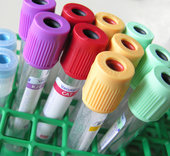What is Functional Medicine? | Why Test? | How are These Tests Different? | Pathological vs. Functional | Saliva vs. Blood | Why Test 2 | What Do We Do With the Results? | Print This Page

Functional Medicine is a system of diagnosing and treating sub-clinical conditions before they become pathology. It utilizes blood, saliva and stool testing to determine the root cause of a variety of low-grade symptoms. Treatment brings the body back into balance through diet and lifestyle changes and nutritional supplementation. It is cutting edge preventative medicine, aimed at determining the underlying cause of symptoms and restoring homeostasis before illness occurs. back to top
At Eastern Body Therapy, we want to understand what is happening with our patients, and we like to have objective ways to track the success of our treatment. In a world of “evidence based medicine”, it is no longer enough to say the patient is feeling better as a measure of success.
Licensed acupuncturists in California are legally able to order blood tests, saliva tests, stool tests, x-rays, MRIs and other laboratory or imaging studies. Using independent laboratories, we are able to order tests which can guide our treatment. back to top
Chances are that you have an insurance plan which dictates which tests are “medically necessary”. Because allopathic medicine and the insurance system are set up to look only for pathology, tests which assess general physiological function in absence of clear evidence of pathology are usually considered to be unnecessary. Sometimes, the tests your insurance company will authorize are simply not comprehensive enough to determine what is really going on. At Eastern Body Therapy, we order the tests we need to look for sub-clinical functional disorders, rather than ordering tests simply to confirm the presence of disease. While this costs you more money in the short run, it provides significantly more information which we can use to find the root of your complaints rather than providing a band-aid solution. back to top
While standard medical laboratories utilize pathological ranges to analyze the results of your blood work, we analyze the results comparing them against functional ranges which are typically narrower. This allows us to find “sub-clinical” functional imbalances which may be causing symptoms even though there is no “pathology”.
The primary difference between the functional and pathological ranges is the degree of deviation allowed within the normal ranges. Pathological ranges are broader, and it is likely that results outside this range ARE indicative of pathology. Pathological ranges are determined by taking the average results from all the people who are tested at a particular lab over a year. Thus, the normal range will be slightly different for every laboratory, and each year the “normal range” changes slightly, based on who was tested at the particular facility.
Functional ranges are generally narrower than pathological ranges, and it is common for there to be deviations from the functional range which are still within the “normal” pathological range. These deviations indicate functional imbalance, but are not indicative of existing pathology. The functional ranges were developed by the American Association of Clinical Chemists (AACC) and are based on a sample of healthy individuals. Utilizing functional ranges to analyze your blood test results allows us to find functional abnormalities before pathology results. Often, these “sub-clinical” abnormalities can be reversed through dietary changes, stress reduction, nutritional support and acupuncture to bring your body back into balance before you reach a pathological state. back to top
Subclinical functional disorders are often caused by subtle imbalances in hormones. Hormones circulating in the blood stream are bound to proteins, and are in an inactive form. In order to bind with a receptor site and fulfill it’s function in the body, a hormone must become unbound from its protein.
Blood tests measure the amount of protein bound hormone which is circulating in your blood. Saliva tests measure the amount of free hormone (hormones not bound to proteins, which are available to bind to a receptor site) in your saliva. back to top
It is possible for your blood levels of protein bound hormone to be completely normal, while the amount of free hormone is significantly elevated or depressed. The typical hormone tests your doctor does will never find these types of abnormalities which may indicate a problem with a conversion pathway between bound and unbound hormones, or receptor-site overload from too much unbound hormone..
Here’s an example of why saliva testing is important: Let’s say you have been having hot flashes. Your friend had great results with an over the counter “natural” progesterone cream, so you decide to try it too. You feel better at first, but gradually the symptoms come back. You use more of the cream and you feel better, but eventually, despite higher and higher doses, it stops working. You go to your doctor, and she does a blood test to check your progesterone level. The test is normal, but you still feel terrible. Your doctor has you try taking birth control pills, but it doesn’t help.
If your doctor had ordered a saliva test for progesterone rather than a blood test, the results are likely to have been quite different. Chances are, the saliva test would show hugely elevated progesterone levels. Why the difference? Because the progesterone which gets into your body from a cream is “free” progesterone. It will not be detected in a blood test, (unless your doctor specifically requests a test for free progesterone, which will be extremely expensive and not covered by your insurance) but will be detected in a saliva test. The extremely high level of free progesterone available to your receptor sites overloads the sites and makes them unable to recognize the progesterone available to them. You keep taking more and more of the hormone, but your body can’t use it. back to top
Based on the findings of your laboratory tests along with your current symptoms and medical history we can develop an individualized treatment program to restore balance and help you feel better. In the example above, the treatment would include a detoxification program designed to clear the excess progesterone from your body, along with diet changes and supplements to stabilize and re-sensitize the progesterone receptor sites. We can re-test at appropriate intervals (typically 30-45 days after beginning diet changes and supplements) to determine if the treatment is working, and will refer you back to your physician if it appears that a condition is becoming worse or requires further evaluation and allopathic medical treatment. back to top
|

 Yelp About Us
Yelp About Us 

